Bird-Watching Uganda
You are a keen bird-watcher, you want to visit some of the best bird-watching sites in Uganda, but you want to do it at your own pace, not with a tour company and at a reasonable price.
Uganda is a unique bird-watching destination, in fact, it has over 1000 species recorded. And, it has a wide range of habitats, from montane rain forests to arid scrubland.
Having lived in Uganda for 16 years, and having visited all the national parks and most of the best bird-watching sites, I am offering you some tips on where to go, where to stay, and how to find the best local bird guides, who are experts on birds in their area.
Whether you’re a beginner or an experienced birder, you’ll find plenty of opportunities to see stunning birds in their natural habitat.
Where to Go Bird-Watching in Uganda
There are many great places to go bird-watching in Uganda, but some of the best include:
Bwindi Impenetrable Forest National Park: Birding in the Heart of Africa
Home to around 350 species, including 23 Albertine Rift Endemics, Bwindi is a must, with different species found at slightly different altitudes, but not far apart.
Where to stay
Cuckooland Tented Lodge email: www.bwindicuckooland.com, info@bwindicuckooland.com or Call 07570399046.
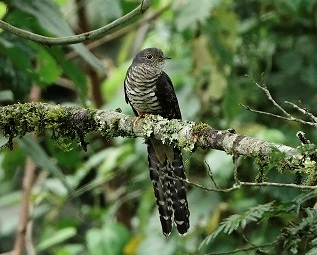
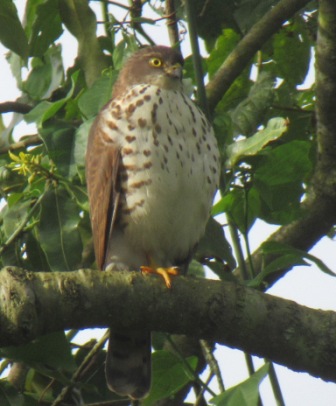
Cuckooland is a superb place for birds.
The lodge occupies 10 acres of regenerating forest, managed as a conservation area for 14 years. Some trees have now grown to a good size.
The lodge sits adjacent to the national park, providing better bird-watching opportunities than inside the park. The vegetation is less dense here, making it easier to spot many bird species that prefer the natural habitat at the forest edge.
More than 300 species have been seen in and immediately around the lodge. including 8 Albertine Rift Endemics (A.R.Es) and many other uncommon species with limited range. The bird list includes for example:
- 18 species of sunbird
- 15 species of greenbul
- 13 species of cuckoo
The website contains a full bird list.
Add to this secluded self-contained accommodation, excellent, mainly home-grown food, total peace and quiet; panoramic views over the forest and a good chance of seeing chimps and 5 other primate species
No park fees need to be paid to stay at the lodge. However, different species can be seen at “the neck” and Ruhija, not far away. In addition, local bird guides are available.
USD75 p person p night for 2 sharing a full board; USD90 for a single.
Royal Mile, Budongo Forest Reserve
One of the most extensive and ecologically diverse forests in East Africa, with more than 360 bird species recorded, Budongo is also well known for its chimpanzees.
Amongst the birds, Budongo specials include chestnut-capped flycatcher, African forest flycatcher, chocolate-backed kingfisher, dwarf kingfisher, Ituri batis, white-thighed hornbill, rufous-crowned eromemola and spotted greenbul, birds seen in few other places in east Africa.
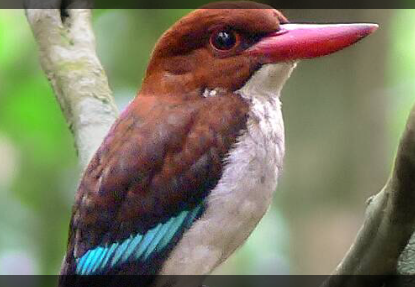
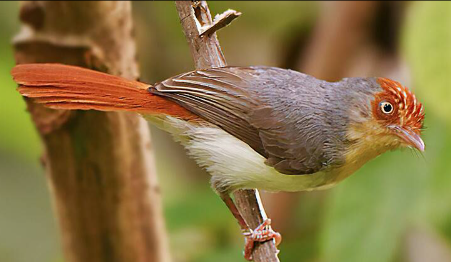
Birding guide
Raymond (0752 930065) is an expert bird guide, with more than 10 years experience of working in Budongo.
Accommodation
In order to get an early start in the morning, I would suggest staying at Nyabyeya College, very close to the Royal Mile.
Simple self-contained rooms are very inexpensive ( $10-15) and simple but wholesome local food is available. Contact Elizabeth at 0704 815423
They charge a fee of around USD 25 to enter the Royal Mile.
Semliki National Park
Serious bird-watchers must visit Semliki, where more than 500 species of birds have been recorded, including many that are found nowhere else in East Africa.
Among the many Semliki specials are the Yellow-throated cuckoo, Swamp palm bulbul Black dwarf hornbill, Red-billed dwarf hornbill, Hartlaub’s duck, Congo serpent eagle, Grant’s bluebill, Long tailed hawk, Blue-billed malimbe and Yellow-footed flycatcher.
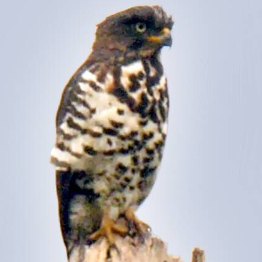
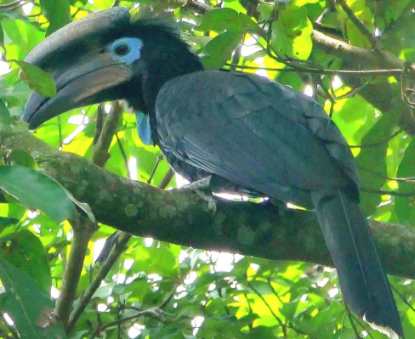
Birding guide
Alex 0778 129283 is an expert guide to Semliki birds, with 5 years of experience in Semliki.
Accommodation
In order to get an early start in the morning, I would recommend staying in the UWA bandas in the park.
Simple self-contained bandas with fans are available for 82,000 Ugx for a double and local food is available at a reasonable price
Park fees are $35 per day, plus extra for a birding walk.
ZIwa Rhino Sanctuary .(0785 477721, Salim)
Conveniently situated on the way to Budongo or Kidepo, Ziwa is a worthwhile bird-watching destination in its own right, with around 350 species recorded including wetland and dry country species.
Notable amongst these are: shoebill, white-crested turaco, African hoopoe, western banded snake-eagle, African golden oriole, brown-backed woodpecker, Heuglin’s francolin, speckled-breasted and Nubian woodpeckers, and northern carmine bee-eater.
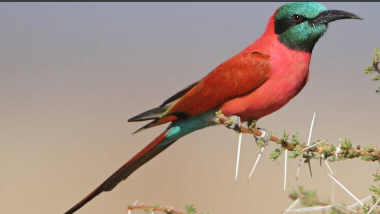
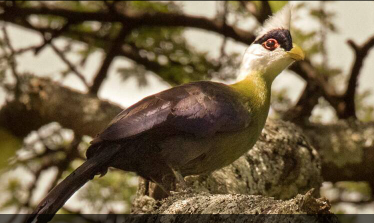
Birding guide
Max Ben, ( 0780 737367 tel & what’s app) though young, is a knowledgeable and friendly bird guide.
Accommodation
Various kinds of accommodation are available, ranging from $80-120 for a double, and cheaper for other options.
There is an entrance fee of around $30 for the rhino sanctuary.
Kidepo National Park
With around 500 bird species recorded, Kidepo is home to many dry country species, rarely found elsewhere in Uganda.
. These include Hemprich’s hornbill, Clapperton’s Francolin, rose-ringed parakeet, Boran cisticola, red pate cisticola, black-breasted barbet, red and yellow barbet, purple grenadier, cliff chat together with around 60 birds of prey.
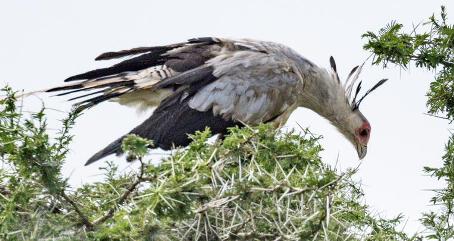
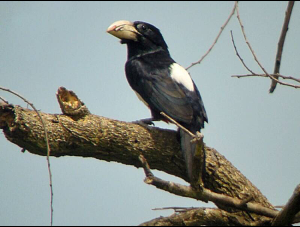
Bird-watching guide
Zakari (tel and What’s App 07770698283 ) is another experienced and knowledgeable local guide with decades of experience in Kidepo.
Accommodation
Here an early start is essential, as it can get hot by 11 am when birds are less easy to see. So I would recommend using accommodation within the park, not outside.
Unless you can afford the $400 or so charged by Paraa Lodge.I recommend staying in the UWA modern bandas(cost around Ugx 100,000($27) for a double ), which are self-contained and have good views of the surrounding plains.(I counted 75 elephants from our doorstep on my visit).
Local food is available at the nearby restaurant, but watch out for buffalo on the path at night!
Park fees are $45 per day plus fees for accompanied game drive/ birdwatching.
Queen Elizabeth National Park Mweya
Keen bird-watchers won’t want to miss a boat trip on the Kazinga Channel from Mweya.
From the boat, you can see a multitude of waterbirds, including pelicans, skimmers, spoonbills, herons, thick-knees, saddle-billed, yellow-billed, and Abdim’s stork, as well as many others that are too numerous to mention. Knowledgeable bird guides are usually present on the boat.
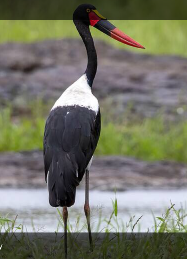
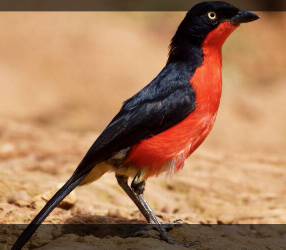
Accommodation
A range of accommodation is available both inside and outside the park.
Inside the park, UWA offers basic self-contained cottages with fans at Lower Camp cottages for around 100,000Ugx for a double. There’s also the pricier but grander Mweya Safari Lodge in its colonial splendor.
Park fees are $45 p day plus, I think, $30 for a boat trip.
Find a vehicle and driver for a bird-watching trip
Rogers ( 07790804354 ) is a safe driver, also knowledgeable about birds and butterflies. It costs $100 per day plus fuel to hire him and his 4wd vehicle which can take up to 5 people.
You can find self-drive vehicles at many car rental companies in Kampala or Entebbe.
How to Plan Your Bird-Watching Trip to Uganda
When planning your bird-watching trip to Uganda, there are a few things you should keep in mind:
- Bird-watching is possible throught the year in Uganda, but in general, you can see more birds at beginning and ends of rainy seasons like January, Febuary, March to June.
- Be sure to pack comfortable shoes and clothing, as you’ll be doing a lot of walking.
- Bring a good pair of binoculars and a bird field guide.
- Hire a local birding guide to help you find and identify birds.
Tips for Bird-Watching in Uganda
Here are a few tips for bird-watching in Uganda:
- Start your bird-watching early in the morning, when birds are most active.
- Be patient and quiet, as birds are easily spooked.
- Listen for bird calls, as this can help you find them.
- Bring a camera to capture your bird-watching memories.
I hope this guide helps you plan your bird-watching trip to Uganda. With its stunning birdlife and diverse landscapes, Uganda is a birdwatcher’s paradise.
Happy birding.
Philip
August 2023
